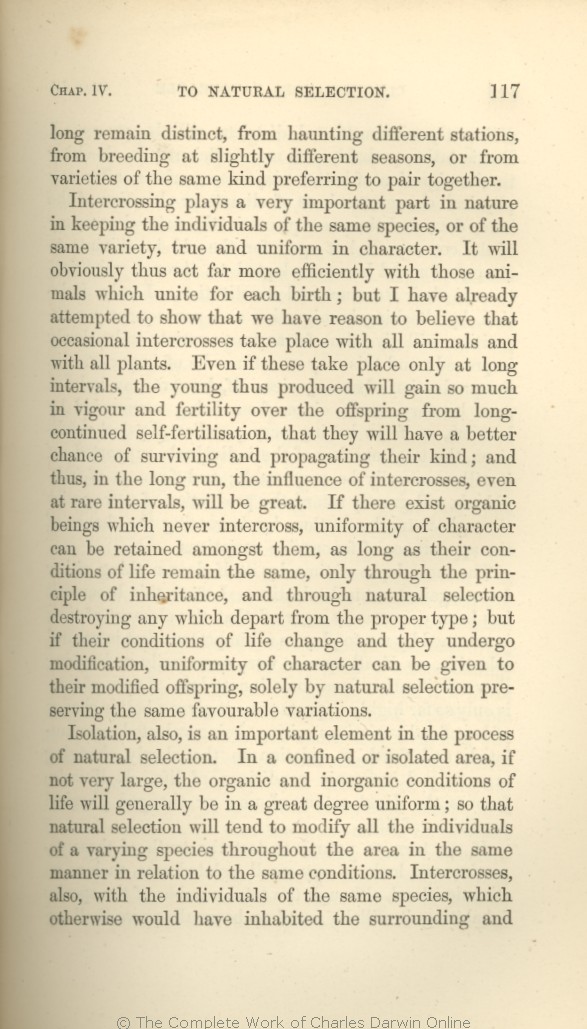Intercrossing plays a very important part in nature
in | in 1859 1860 1861 1866 1869 | | by 1872 |
| but 1859 1860 1861 1866 1869 | | but, 1872 |
| I have already attempted to show that 1859 1860 1861 1866 |
| as already stated 1869 |
| as already stated, 1872 |
| with all 1859 1860 1861 1866 1869 | with all 1872 |
| intervals, 1859 1860 1861 1866 | | intervals 1869 1872 |
| OMIT 1861 1866 |
| I am convinced that 1859 1860 |
| of time, 1869 1872 |
| intercrosses, 1859 1860 1861 1866 1869 | | crosses, 1872 |
| If there exist 1859 1860 1861 1866 1869 |
| With respect to 1872 |
| which never 1859 1860 1861 1866 1869 |
| extremely low in the scale, which do not propagate sexually, nor conjugate, and which cannot possibly 1872 |
| amongst 1859 1860 1861 1866 1869 | | by 1872 |
| them, 1859 1860 1861 1866 1869 | | them 1872 |
| as long as their 1859 1860 1861 1866 1869 |
| under the same 1872 |
| life 1859 1860 1861 1866 1869 | | life, 1872 |
| remain the same, 1859 1860 1861 1866 1869 |
| OMIT 1872 |
| inheritance, 1859 1860 1861 1866 1872 | | inheritance 1869 |
| destroying any which depart 1859 1860 1861 1866 1869 |
| which will destroy any individuals departing 1872 |
| type; 1859 1860 1861 1866 1869 | | type. 1872 |
| but if their 1859 1860 1861 1866 1869 |
| If the 1872 |
| they 1859 1860 1861 1866 1869 | | the 1872 |
| undergo 1859 1860 1861 1866 1869 | | form undergoes 1872 |
| their 1859 1860 1861 1866 1869 | | the 1872 |
| the same 1859 1860 1861 1866 | | similar 1869 1872 |
|
Isolation, also, is an important element in the
process of | process of 1859 1860 1861 1866 |
| changes effected through 1869 |
| modification of 1872 |
| natural 1859 1860 1861 1866 1869 |
| species through natural 1872 |
| in a great degree 1859 1860 1861 1866 |
| almost 1869 1872 |
| individuals of a varying species throughout the area 1859 1860 1861 1866 |
| varying individuals of the same species 1869 1872 |
| manner 1859 1860 1861 1866 | | manner. 1869 1872 |
| in 1859 1860 1861 1866 | in 1869 1872 |
| relation 1859 1860 1861 1866 | relation 1869 1872 |
| to 1859 1860 1861 1866 | to 1869 1872 |
| the 1859 1860 1861 1866 | the 1869 1872 |
| same 1859 1860 1861 1866 | same 1869 1872 |
| conditions. 1859 1860 1861 1866 | conditions. 1869 1872 |
| Intercrosses, 1859 1860 1861 1866 | | Intercrossing 1869 1872 |
| also, 1859 1860 1861 1866 | also, 1869 1872 |
| individuals 1859 1860 1861 1866 | | inhabitants 1869 1872 |
| same species, which othewise would have inhabited the surrounding and differently circumstanced 1866 |
| same species, which otherwise would have inhabited the surrounding and differently circumstanced 1859 1860 1861 |
| surrounding 1869 1872 |
|









